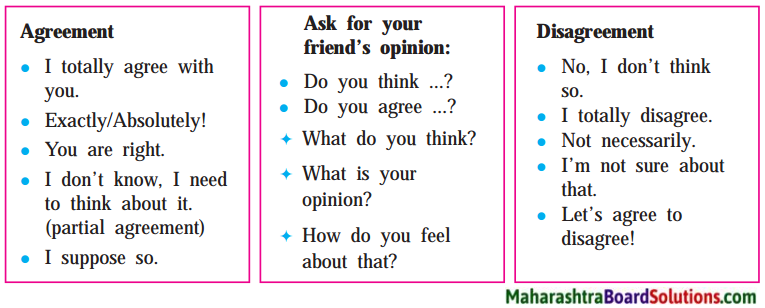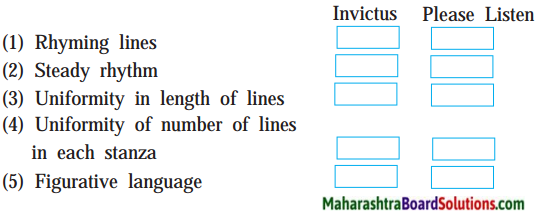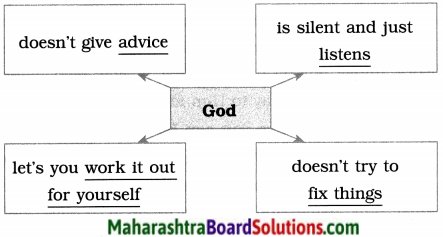Balbharti Maharashtra State Board Class 9 English Solutions Kumarbharati Chapter 4.1 Please Listen Notes, Textbook Exercise Important Questions and Answers.
Maharashtra State Board Class 9 English Kumarbharati Solutions Chapter 4.1 Please Listen!
English Kumarbharati 9th Solutions Chapter 4.1 Please Listen! Textbook Questions and Answers
Warming Up:
1. Form groups of 6-8. One person (leader) chooses one item – a picture, a paragraph or a lesson from any one of the 9th standard textbooks and writes the reference on a piece of paper and folds it. Others ask him/her questions and try to guess what it is, from his/her answers. Example: (The leader thinks and writes something on a piece of paper. He folds it and keeps it on the table. Others ask questions.)
Question 1.
Is it something from social studies?
Answer:
No.
![]()
Question 2.
From Science or Maths?
Answer:
No.
Question 3.
Languages?
Answer:
Yes.
Question 4.
From the English Kumarbharati?
Answer:
Yes.
Question 5.
A prose lesson?
Answer:
No.
Question 6.
A nature poem?
Answer:
No.
![]()
Question 7.
Is it in the first unit?
Answer:
No.
Question 8.
Second unit?
Answer:
Yes.
Question 9.
Inspirational poem?
Answer:
Yes.
Invictus!!
Leader shows the folded paper; answer is Invictus!
Agreements and Disagreements.
2. Form pairs. List the things on which you ! have the same opinion and also the ones on which you have different opinions. Prepare a list of ten things in all and see how far you agree or disagree with your friend. Some useful phrases are given alongside.
Question 1.
Form pairs. List the things on which you ! have the same opinion and also the ones on which you have different opinions. Prepare a list of ten things in all and see how far you agree or disagree with your friend. Some useful phrases are given alongside.
You could talk about:
- Clothes, latest fashion.
- Performance of sportsmen and women.
- Trafficll’ransport in your area.
- Cleanliness and hygiene in your area.
- Future occupations/Careers.
- Latest news items.
- TV programmes
- Mobile Apps
- Any subject of your choice.

English Workshop:
1. The poet uses a free, conversational style in his poem. It is also called Colloquial style. Pick out and write down such lines or expressions that support the above statement.
Question 1.
The poet uses a free, conversational style in his poem. It is also called Colloquial style. Pick out and write down such lines or expressions that support the above statement.
(a) ………………………. You have not done what I asked.
(b) ……………………………………………………………………..
(c) ……………………………………………………………………..
(d) ……………………………………………………………………..
(e) ……………………………………………………………………..
(f) ……………………………………………………………………..
Answer:
(a) You have not done what I asked.
(b) You are trampling on my feelings.
(c) All that I ask is that you listen.
(d) When you do something for me that I can and need to do for myself, you contribute to my fear and inadequacy.
(e) But when you accept as a simple fact that I feel what I feel.
(f) then I can stop trying to convince you have not done what I asked.
![]()
2. Put the following expressions in a table of Dos and Don’ts as expressed by the poet.
Question 1.
Put the following expressions in a table of Dos and Don’ts as expressed by the poet.
(a) Please listen.
(b) give me advice.
(c) tell me why.
(d) solve my problem
(e) just hear me.
(f) accept as a simple fact
(g) contribute to my fear
(h) wait a minute

Answer:
| Dos | Don’ts |
| 1. please listen | 1. give me advice |
| 2. just hear me | 2. tell me why |
| 3. accept my feelings as a simple fact | 3. solve my problem |
| 4. wait a minute | 4. contribute to my fear |
3. Write in your own words.
Question a.
What does the listener do when the poet asks him to just listen? Give 3 points.
Answer:
When the poet asks the listener to just listen, the listener either:
- gives advice
- tells him why he shouldn’t feel that way, or
- tries to solve the; poet’s problem.
![]()
Question b.
Why does the poet remark that advice is cheap?
Answer:
The poet remarks that advice is cheap because everyone is willing to give advice. You only had to write to the agony column of any newspaper with your problems and you could get advice from the columnists. You had to spend just 20 cents to buy the paper.
Question c.
Which two facts show that the poet is confident of overcoming his irrational feelings?
Answer:
The two facts that show that the poet ; is confident of overcoming his irrational feelings 5 are : first, he says he will understand what is behind these feelings. Second, he says that when the answers become obvious, he will not need any advice.
4. According to the poet, how does God help people when they pray to Him for help?
Question 1.
According to the poet, how does God help people when they pray to Him for help?
Answer:
According to the poet, God doesn’t try to give advice or fix things. He is silent and let’s one work things out by oneself. That is how God helps people when they pray to Him for help.
5. Why should one learn to tackle one’s problems by one’s own self?
Question 1.
Why should one learn to tackle one’s problems by one’s own self?
Answer:
When one tackles one’s problems by oneself, one overcomes feelings of fear and inadequacy. Hence one should learn to tackle one’s problems by one’s own self.
![]()
6. Why should seniors not over-protect or over-pamper juniors?
Question 1.
Why should seniors not over-protect or over-pamper juniors?
Answer:
If seniors over-protect or over-pamper juniors, the juniors will be unable to stand on their own feet and face the world. They will not be able to overcome their feelings of fear and inadequacy. They will not become confident. Hence, seniors should not over-protect or over-pamper juniors.
7. Find out and write down some proverbs/ axioms/quotations that convey a message similar to ‘Self-help is the best help.’
Question 1.
Find out and write down some proverbs/ axioms/quotations that convey a message similar to ‘Self-help is the best help.’
Answer:
Examples:
- God helps those who help themselves.
- Self-help is the root of all success.
8. Maintain a diary for at least a week. Write about your interactions with other people in your surroundings in 3-4 lines. Also write whether you find the interactions happy – unhappy, satisfactory – unsatisfactory, enjoyable – stressful, etc.
Question 1.
Maintain a diary for at least a week. Write about your interactions with other people in your surroundings in 3-4 lines. Also write whether you find the interactions happy – unhappy, satisfactory – unsatisfactory, enjoyable – stressful, etc.
Answer:
Jan. 1: Today is New Year’s day. Holiday for J everyone. Mummy baked a yummy cake. I helped her. Papa and I went for a long walk in the park. Have made heaps of resolutions. Intend to keep every one of them. Am full of determination. Have decided to ‘ ask Seemadidi for help. A wonderful day!
Jan. 2: Not such a good day. Broke my first resolution. Overslept and had to rush to school with my shoes in my hand! Luckily my homework was all done. Kept my resolution of doing my studies before going out to play football. Had an argument with Sahil on the ground. But it ended well.
![]()
9. Write an informal letter from a teenager to his/her parent expressing a few thoughts from the poem.
Question 1.
Write an informal letter from a teenager to his/her parent expressing a few thoughts from the poem.
Answer:
Room No. 3
Ladies’ Hostel
Aundh Road
Pune – 411 007.
14th October, 2020
Dearest Mom,
Hi! Sorry, sorry, dear Mom. Are you surprised to see this letter? I wanted to talk to you about this, but then I thought I will be able to express myself better in a letter.
Mom, when I told you about the problems I was having 1 with my roommate here at the hostel, I only wanted j you to listen. I knew I was being irrational at times, and I was trying to understand this feeling. It would have taken me some time, but I would have finally got things sorted out on my own. I’m sorry, but I did not need advice, or any solutions. Now I’ve solved my problem and I am at peace.
I’m sorry, Mom, if I’ve hurt you by snapping at your good intentions. But I’m learning. I still need your support, but I have to make my own way in this world, and this is the first step. Please try to understand this.
Love you always.
Your loving daughter,
Ananya
![]()
10. Read aloud a couple of stanzas of the poem j ‘Invictus’ and ‘Please Listen’. In what ways do j they differ? Think and fill up the table with a ‘Yes’ or ‘No’.
Question 1.
Read aloud a couple of stanzas of the poem ‘Invictus’ and ‘Please Listen’. In what ways do j they differ? Think and fill up the table with a ‘Yes’ or ‘No’.

‘Invictus’ is an example of Traditional Poetry. ‘Please Listen’ is an example of Free Verse.
Answer:
| Invictus | Please Listen | |
| 1. Rhyming lines | Yes | No |
| 2. Steady rhythm | Yes | No |
| 3. Uniformity in length of lines | Yes | No |
| 4. Uniformity in number of lines in each stanza | Yes | No |
| 5. Figurative language | Yes | No |
| 6. Example of | Traditional poetry | Free verse |
English Kumarbharati 9th Digest Chapter 4.1 Please Listen Additional Important Questions and Answers
Simple Factual Activity:
Question 1.
Say whether the following statements are True or False:
Answer:
- The poet wants advice from the listener – False
- The poet wants sympathy from the listener – False
- The poet wants solutions from the listener – False
- The poet wants the listener to listen to him silently – True
![]()
Complex Factual Activity.
Question 1.
How old is the speaker in the poem?
Answer:
The speaker must be a teenager or a young person who is impatient and does not want advice or solutions.
Question 2.
Who is he/she talking to?
Answer:
He /She is talking to someone older a parent or a friend.
Activities based on Poetic Devices.
Question 1.
Pick out the two verbs that are repeated ; throughout the extract.
Answer:
The verbs ‘ask’ and ‘listen’ are repeated throughout the extract.
Question 2.
What style is the poem written in?
Answer:
The poem is written in the conversational or colloquial style.
![]()
Simple Factual Activity.
Question 1.
Fill in the blanks with the correct words:
Answer:
1. The poet says that he may be discouraged and faltering, but he is not helpless.
2. The poet accepts that he has irrational feelings.
Complex Factual Activities.
Question 1.
Is the speaker aware of his shortcomings?
Answer:
Yes, the speaker is aware of his/her shortcomings.
Question 2.
What must have happened before the speaker says all this?
Answer:
The speaker must have had some emotional stress and problems, some feelings that he/she could not find reasonable explanations for.
Activities based on Poetic Devices.
Question 1.
Is there any figurative language in the poem?
Answer:
No, there is not much figurative language in the poem.
![]()
Simple Factual Activity.
Question 1.
Complete the web:
(The answers are given directly and underlined.)

Think discuss and answer:
Question a.
Does he/she want to improve?
Answer:
Yes, he/she wants to improve.
Question b.
Is he/she confident that he/she can improve?
Answer:
Yes, he/she is confident that he/she can improve.
![]()
Question c.
How does he/she want to work it out?
Answer:
He/She wants to work it out on his/her own.
Question d.
Is the poet willing to listen to others?
Answer:
Yes, the poet is willing to listen to others.
Answer the following questions:
Question 1.
Discuss how you can be a good listener.
Answer:
To be a good listener, we must pay attention to what a person is saying without interruption. We must only listen and not try to form replies and counter-arguments in our own mind. We must also nod and show correct expressions to encourage the speaker.
Activities based on Poetic Devices:
Question 1.
The poet uses a free, conversational style in his poem. It is also called Colloquial style. Pick out and write down such lines or expressions that support the above statement.
Answer:
1. So please listen, and just hear me
2. And if you want to talk, wait a minute for your turn – and I will listen to you.
![]()
Question 2.
Comment upon the length of lines and the number of lines in each stanza.
Answer:
There is no uniformity in the length of lines or the number of lines in each stanza. It appears as if the poem has first been written in prose and then broken up into separate lines.
Point Format (for understanding).
- Title: Please Listen!
- Poet: Unknown (anonymous)
- Rhyme Scheme: The poem is in free verse. Hence there is no rhyme scheme.
- Figure of Speech: Repetition. ‘When I ask you to listen to me’. This line has been repeated in the poem for emphasis.
- Theme/Central idea: The poet tells us how he just wishes that people would listen to a person’s problems silentiy, instead of giving advice.
The poet is confident that he will find out the reasons behind his irrational feelings and then he will be able to solve his problems by himself. He feels that prayers probably work because God just listens to us silently when we pray and then lets us work things out ourselves. Through the poem, the poet implies that we too should work things out ourselves when we are faced with difficulties or have some irrational feelings.
Paragraph Format.
The poem ‘Please Listen!’ is written by an unknown poet (anonymous).
The poem is in free verse. Hence there is no rhyme scheme. There are not many figures of speech. The important Figure of Speech is Repetition: ‘When I ask you to listen to me’. This line has been repeated in the poem for emphasis.
The poet tells us how he just wishes that people would listen to a person’s problems silently, instead of giving advice. The poet is confident that he will find out the reasons behind his irrational feelings and then he will be able to solve his problems by himself. He feels that prayers probably work because God just listens to us silently when we pray and then lets us work things out ourselves. Through the poem, the poet implies that we too should work things out ourselves when we are faced with difficulties or have some irrational feelings.
![]()
Vocabulary Focus.
Question 1.
What is the difference between ‘hear’ and ‘listen’?
Answer:
- ‘To hear’ means to receive with the ear the sound made by someone or something; to be aware of some sound.
- ‘To listen’ means to consciously give one’s attention to a sound and try to understand it.